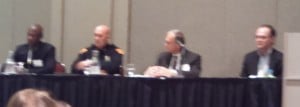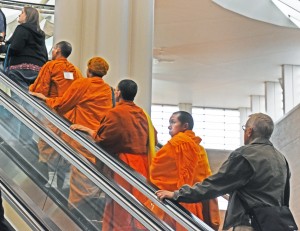 Just before the recent incident at Spring Valley High School between a student and a school resource officer, I attended a panel at the Parliament of the World’s Religions called “Compassion and Law Enforcement.” In light of renewed concern about such conflicts, I want to share the notes I made as an audience member. Panelists were Chief Steve Conrad of Louisville, Kentucky, Chief Devon Clunis of Winnipeg, Canada, and Chief Mike Brown of Salt Lake City, Utah. Below are some brief points – most are not new ideas, but all are worthwhile considerations for those of us seeking peaceful communities.
Just before the recent incident at Spring Valley High School between a student and a school resource officer, I attended a panel at the Parliament of the World’s Religions called “Compassion and Law Enforcement.” In light of renewed concern about such conflicts, I want to share the notes I made as an audience member. Panelists were Chief Steve Conrad of Louisville, Kentucky, Chief Devon Clunis of Winnipeg, Canada, and Chief Mike Brown of Salt Lake City, Utah. Below are some brief points – most are not new ideas, but all are worthwhile considerations for those of us seeking peaceful communities.
What if a city became a laboratory for compassionate practice? What if policing were compassionate? Driven by compassion? What would that look like?
How can we as officers restore people? What we’ve been doing is not working. We must do something significantly different. There are far too many people in prison, but incarceration is not helping the crime rate in the U.S. We are not going to be able to arrest our way out of our problems. We simply must address the root causes of crime. That means we achieve crime prevention through social change –tackling poverty, economic justice, education, mental health and addictions, early childhood education, jobs for parolees. An addict commits at least one crime per day to support her habit. We can’t fix that by arresting her. We must also take better responsibility for helping parolees transition back into the community. We try to help and fix juvenile offenders; why don’t we do the same for adults? Most of the currently swelling prison populations will be released in the future. How do we help them become part of our communities again?
To build a city you need restorative justice. This is not just about restoring individuals, but also about restoring community. Police are in a position to bring people together and help them understand each other. One of the panelists told a story about a young man throwing a brick through a woman’s house. Instead of asking for him to be arrested when he was caught, the woman asked to meet him. She brought her granddaughter and said, “She was sleeping on the sofa underneath the window when you threw the rock. We are lucky she was not hurt. I have lived in this neighborhood all my life and helped all of you who grew up here. Why do you want to hurt us?” The perpetrator apologized and asked her what he could do to show his remorse. She asked him to rake her yard, which he did, returning to do more than originally agreed. The woman got help with her yard, the young man avoided a criminal record, and all three had the experience of coming together rather than going to court and perpetuating conflict.
Cops need compassion, too. They see too much, have personal problems, and burn out. Cynicism is a common challenge. There are too many suicides of officers. We should constantly remind officers why they came to the job. We got into this job because we wanted to serve. When police are asked, “Are you still doing what you thought you were going to do when you started?” most say no. Who can help officers deal with their stress? Chief Clunis recommends that police pray for wisdom and for a strong work ethic. All the panelists agreed that chiefs must model the behaviors expected of the force. All employees in a department need to regularly hear how much we appreciate them. One panelist-chief goes on a weekly ride-along his officers to let them know they are appreciated and to stay in touch with daily policing. The department and officers develop emotional capital by attending community events. These are great opportunities for informal interaction between officers and citizens. Allowing police to tell their own stories to those who have been arrested has also proven to be very healing.
It is possible for good to come out of the past year’s disruptions-tragedies. Change must start within police departments; we need to set the example to our communities. Learning about compassion has to start in the police academy, from the very first day. We need to recruit way more minorities on our forces. Our system of justice is founded on the idea of treating people right. We help people on the very worst day of their life, when they have no other place to turn. We must shift from being warriors to being guardians of the community.
For readers who may not know, Louisville is well-known for its large annual city interfaith event which has hosted the likes of the Dalai Lama, and for being one of the few cities in the U.S. which has achieved the status of Compassionate City with the Charter For Compassion organization. Here in Richland County, our sheriff (Leon Lott) and his department have led the region in implementing community policing for the past twenty years, with admirable results. As a minority faith liaison with the department for the past decade, I found the Compassion and Law Enforcement presentation to be inspiring and affirming.















